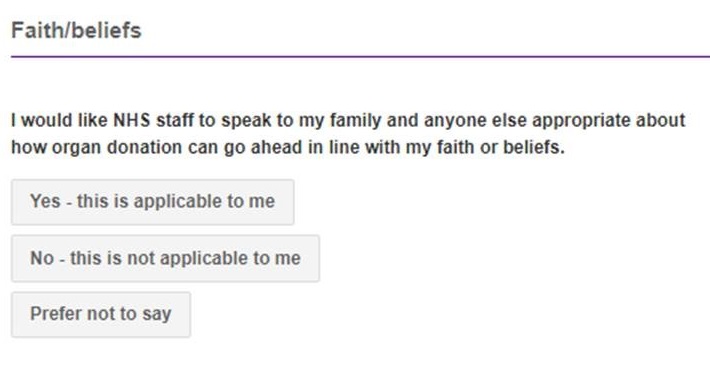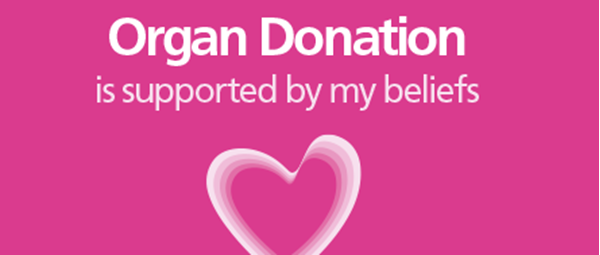Does my religion, faith or belief system permit organ donation?
All the major religions and belief systems in the UK support the principles of organ donation and transplantation and accept that organ donation is an individual choice.
If donation is possible at the time of your death, NHS staff will speak to your family to explore how organ donation can proceed in line with your faith or beliefs.
We've worked with faith leaders and communities to build trust, raise awareness and discuss the barriers to organ and/or tissue donation and how organ donation can proceed in line with faith or beliefs.
How can I make sure that my faith and beliefs will be respected if I am an organ donor?
When you register as an organ donor on the NHS Organ Donor Register, you can now state on the registration whether or not you would like the NHS to speak to your family, and anyone else appropriate, about how organ donation can go ahead in line with your faith or belief system.

You can do this by answering an optional question during the online registration process or through our contact centre (call 0300 123 23 23).
The declaration style question states:
I would like NHS staff to speak to my family (and anyone else appropriate) about how organ donation can go ahead in line with my faith or beliefs.
- Yes – this is applicable to me
- No – this is not applicable to me
- Prefer not to say
You can select ‘yes’, ‘no’, or 'prefer not to say'. You can also ignore the question.
A response to this statement will be part of your NHS Organ Donor Register record. Specialist nurses in organ donation working for NHS Blood and Transplant have access to the NHS Organ Donor Register. If you are identified as a potential donor, a specialist nurse will be able to view your full NHS Organ Donor Register record and see if a response has been recorded to this question.
While our specialist nurses already discuss faith and beliefs with your family when they talk to them about organ donation, this new feature will provide additional reassurance to those who may have further issues to consider that are important to them. This may include questions such as whether a family or religious figure will have time to say prayers, how washing or dressing requirements in line with your faith will be met and whether a swift burial will still be possible.
Our specialist nurses will respect the decision recorded on the NHS Organ Donor Register and will discuss what this means with the family as part of end-of-life care conversations.
Questions?
Get answers here
Select a question from the list or scroll down to read them all.
- Don’t specialist nurses already discuss faith and beliefs with families?
- Is the new faith and beliefs question mandatory?
- Why hasn’t this feature been added before now?
- I have already registered and didn’t have this question offered to me, how can I update it?
- If I say yes, that I want NHS staff to talk to my family and anyone else appropriate about my faith and beliefs, what else do I have to do?
- I have changed my mind about the answer I gave for the faith and beliefs declaration, how do I update it?
- I don’t know if my faith or belief system supports organ donation, how can I find out?
- What does it mean if I say yes, that I want the NHS to talk to my family and anyone else appropriate about my faith and beliefs when registering as an organ donor?
- What does it mean if I say no, that it is not applicable to me for the NHS to talk to my family and anyone else appropriate about my faith and beliefs?
- What is the difference between the faith and beliefs declaration and the religion question on the registration form?
- What if I register as a donor but my family disagrees about whether my desire to donate is supported by my faith or belief system?
- I want to show people my support for organ donation and that I feel it fits with my faith or beliefs. How can I do this?
- Why are the faith and belief donor cards only available online?
Don’t specialist nurses already discuss faith and beliefs with families?
Yes they do. We hope this declaration will provide additional reassurance. This is the first time someone can proactively record on the NHS Organ Donor Register whether or not they want the NHS to talk to their family and anyone else appropriate about how organ donation can go ahead in line with their faith and beliefs.
Is the new faith and beliefs question mandatory?
No. Someone can answer yes if it’s applicable to them, answer no, or answer that they prefer not to say. They can also ignore the question and still proceed to record their organ and tissue donation decision
Why hasn’t this feature been added before now?
Our specialist organ donation nurses have always explored an individual’s faith and beliefs with families as a matter of routine. However, the Government’s consultation on organ donation in England highlighted the role of faith and beliefs further and this is one of the ways the Government and NHS Blood and Transplant have addressed the issue.
I have already registered and didn’t have this question offered to me, how can I update it?
If you have already recorded a decision to donate on the NHS Organ Donor Register you can amend your registration online, or contact us on 0300 123 23 23 where we will be happy to update your record. If you live in England you can also update your registration using the NHS App.
If I say yes, that I want NHS staff to talk to my family and anyone else appropriate about my faith and beliefs, what else do I have to do?
We need everyone to share their organ donation decision with their family. This is important because your relatives will be asked to discuss donating your organs before donation can proceed. Make sure you know your family knows why you want to be a donor, and how it fits with your faith and beliefs and tell them any particular requests or requirements you have. Such as if you want them to involve a faith leader or pastoral carer in any organ donation discussions.
I have changed my mind about the answer I gave for the faith and beliefs declaration, how do I update it?
Just go to our amend your details form and update your registration. Your record will be updated. Alternatively, you can call us on 0300 123 23 23 or update your registration if you live in England using the NHS App.
I don’t know if my faith or belief system supports organ donation, how can I find out?
To clarify your particular faith or belief system’s views on organ donation, you can take a look at the ‘Organ donation and my beliefs’ section of the organ donation website. You may also wish to speak to your adviser from your religion or belief group.
What does it mean if I say yes, that I want the NHS to talk to my family and anyone else appropriate about my faith and beliefs when registering as an organ donor?
Specialist nurses for organ donation check to see if someone had recorded a decision on the NHS Organ Donor Register before discussing donation with an individual’s family.
If you register as an organ donor and say yes in response to the faith/beliefs question, a specialist nurse will be able to see this when they access your record.
When they talk to your family, they will explain that you registered as an organ donor and will discuss your faith, beliefs and values. During the conversation, they will answer any questions and seek further guidance or support from additional family members and / or representatives from your faith/belief if required.
What does it mean if I say no, that it is not applicable to me for the NHS to talk to my family and anyone else appropriate about my faith and beliefs?
If you say no, our specialist nurses will respect that you have indicated that you do not want your faith or beliefs to be discussed prior to organ donation proceeding. The specialist nurse will still ask your family what is important to them in honouring your decision to be an organ donor.
What is the difference between the faith and beliefs declaration and the religion question on the registration form?
The optional information we ask for under the ‘religion’ question is only used for statistical analysis by us at NHS Blood and Transplant and is not recorded against your registration. The faith and beliefs declaration is recorded against your registration and will be visible to our specialist nurses, to enable the conversation about your requirements to take place with your family. The Specialist Nurses will not know what faith or beliefs you had, as they do not have access to the information on religion at the end of the form.
What if I register as a donor but my family disagrees about whether my desire to donate is supported by my faith or belief system?
The focus of our specialist nurses is to try and identify what you would want and how donation can go ahead in line with your beliefs. Our nurses will explore any issues raised by your family and work with them to allay any fears or concerns. They can also arrange for a faith leader to provide advice if the family so wish.
Our nurses would try and help your family respect your decision.
I want to show people my support for organ donation and that I feel it fits with my faith or beliefs. How can I do this?
The organ donor card that we send out to all new registrants is a very popular symbol of someone’s decision to be an organ donor and we see thousands of people share pictures of their organ donor card each year. Many people also use its arrival in the post as a conversation starter with their family too.
Recognising that someone’s faith or beliefs can play an important role in their decision to be an organ donor we have worked with faith leaders and other organisations (such as Humanists UK) to develop downloadable faith and belief-specific donor cards.
- You can download and share a card appropriate to you with your friends and family to show you want to be an organ donor.
Why are the faith and belief donor cards only available online?
As a person’s faith and belief is very sensitive to them, we don’t collect and store that information against your registration. Therefore, we are unable to send out a card that is specific to you. Instead, we send the standard organ donor card to everyone who registers as an organ donor for the first time.
Support for donation
Find out more about how the major faiths and beliefs systems support organ donation

Faith and belief donor cards
Faith and belief-specific donor cards are available to download, print and share.
